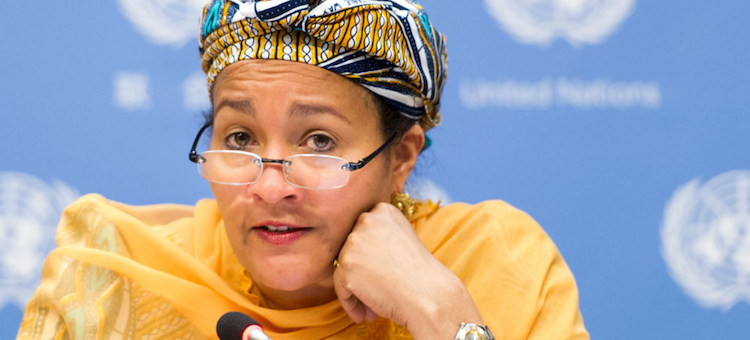By Amina Mohammed
Following are extensive excerpts from UN Deputy Secretary-General Amina Mohammed’s remarks to the 31st ordinary session of the African Union in Nouakchott, Mauritania, on July 1, 2018. – The Editor.
NOUAKCHOTT, Mauritania (IDN-INPS) – The Secretary-General of the United Nations, António Guterres, places great importance on our long-standing but new-found strategic partnership with the African Union. Sustainable development is at the centre of that work. Africa’s Agenda 2063 and the 2030 Agenda for Sustainable Development share a common vision and, together, they provide the basis for the African Union-United Nations Partnership framework for development informing the action plan to be launched in Addis Ababa in the coming days.
Peace and stability are also our shared goals. The Joint African Union-United Nations Framework for Enhanced Partnership in Peace and Security is our road map for resolving crises, silencing the guns, averting the eruption of armed conflicts and, above all, preventing human suffering. Today we are working together with some success across the continent. With Africa firmly in the lead, we need to do more to strengthen this partnership.
Too often, the world views Africa solely through a prism of problems, thus shaping the wrong narrative. I want the world to see what I see and that I know, as a daughter of this soil. I see continuous progress and enormous dynamism across Africa in spite of the huge challenges. Entrepreneurship is thriving. Access to all levels of education has increased. Child and maternal mortality has declined. More women are serving in decision-making roles. Economic growth in several countries is higher than in other parts of the world. The Continental Free Trade area is a vital step that will unleash trade and innovation to benefit millions.
I see African leaders taking the lead to resolve African crises, and building stronger architecture within the African Union to support these efforts, including through current reforms, preventive diplomacy and peace support operations.
I see the potential of the African Union Great Green Wall that can protect millions of people from the impacts of climate change and desertification – while integrating renewable energy and investments in many value chains that place Africa at the forefront of climate action. I see one of the most reliable contributors to United Nations peacekeeping operations. Of the more than 90,000 troops and police in today’s United Nations missions, nearly half are from Africa.
I see a generous humanitarian actor. Africa hosts more than a quarter of the world’s 65 million refugees and displaced people, showing a solidarity that is often missing elsewhere in our world. I see a continent where women have led the way not only in galvanizing economic growth but also in defusing societal tensions and forging peace. And I see a determination to address governance, build accountable institutions that serve Africa’s people.
The African Anti-Corruption Year is a welcome initiative to crack down on bribery, fraud, tax evasion, illegal mining and logging and other illicit acts that drain billions of dollars from Africa every year – and undermine trust in global governance, sadly impacting investments that undermine growth of African economies.
Africa’s transformation is clearly under way, and the United Nations will continue to reinforce and support it in words and deeds. Through the African Union-United Nations Joint Framework on the Implementation of Agendas 2030 and 2063, we will ensure your priorities are ours. By aligning policy, programming and accountability, we can amplify impact at the country and regional levels.
We are collaborating to advance democratic governance, women’s empowerment, job creation for young people, human rights for all and efforts to combat terrorism and violent extremism.
We will continue to support Africa’s electoral processes and the Demographic Dividend Roadmap, as well as efforts to address inequalities, exclusion and marginalization. In this, we must place our youth, especially our girls, at the centre. We are enhancing our partnership to address global health pandemics, including our joint efforts to combat the recent outbreak of Ebola on the continent.
We are strengthening support for African peace efforts, including AMISOM (African Union Mission to Somalia), the G5-Sahel Joint Force and the Multinational Joint Task Force against Boko Haram, as well as capacity-building to counter and prevent terrorism and violent extremism.
Here in Mauritania this week, we are announcing a re-calibrated strategy for the Sahel and a new effort to mobilize resources. The recently finalized United Nations Support Plan for the Sahel is repositioned to channel resources towards interventions and investments that meet the needs, priorities and plans of the Sahelian people and countries in the context of the complex challenges.
And in the days ahead, African Union and United Nations leaders, including myself, will be undertaking a joint mission to Chad, Niger and South Sudan with a focus on advancing peace and development through the equality, empowerment and well-being of young people, especially our women and girls.
As Africa drives its own future, the international community must meet its responsibility to support your efforts with investments that yield results underpinned by transparency and accountability. The United Nations in solidarity will stand with you in serving Africa’s people and ushering in a future of security, opportunity and dignity for all. [IDN-InDepthNews – 07 July 2018]
Photo: UN Deputy Secretary-General Amina Mohammed. UN Photo/Mark Garten
IDN is flagship agency of the International Press Syndicate.
facebook.com/IDN.GoingDeeper – twitter.com/InDepthNews

